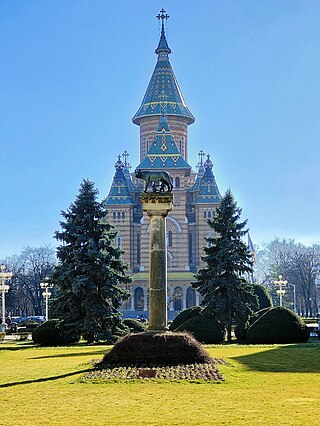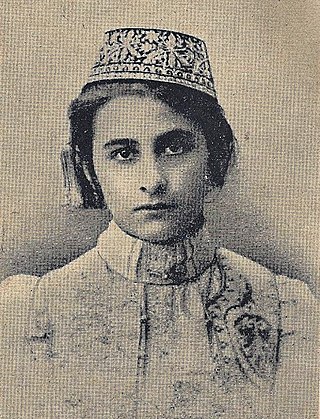
The Tatars, formerly also spelled Tartars, is an umbrella term for different Turkic ethnic groups bearing the name "Tatar" across Eastern Europe and Asia.

Constanța is a county (județ) of Romania on the border with Bulgaria, in the Dobruja region. Its capital city is also named Constanța.
The Crimean Tatar diaspora dates back to the annexation of Crimea by Russia in 1783, after which Crimean Tatars emigrated in a series of waves spanning the period from 1783 to 1917. The diaspora was largely the result of the destruction of their social and economic life as a consequence of integration into the Russian Empire.

The Romanian Constitution provides seats in the Chamber of Deputies for representatives of ethnic minorities in Romania. Minority organizations are exempt from the electoral threshold, and are guaranteed a seat so long as they earn at least 10% of the vote that was required for the last party eligible to earn a seat through the threshold.

Bulgarian Turks are ethnic Turks from Bulgaria. According to the 2021 census, there were 508,375 Bulgarians of Turkish descent, roughly 8.4% of the population, making them the country's largest ethnic minority. Bulgarian Turks also comprise the largest single population of Turks in the Balkans. They primarily live in the southern province of Kardzhali and the northeastern provinces of Shumen, Silistra, Razgrad and Targovishte. There is also a diaspora outside Bulgaria in countries such as Turkey, Austria, the Netherlands, Sweden, Norway and Romania, the most significant of which are the Bulgarian Turks in Turkey.

Tatars in Bulgaria are Crimean Tatar, but also Nogai Tatar minorities in Bulgaria.

The Tatars of Romania, Tatars of Dobruja or Dobrujan Tatars are a Turkic ethnic group that have been present in Romania since the 13th century. According to the 2011 census, 20,282 people declared themselves as Tatar, most of them being Crimean Tatars and living in Constanța County. But according to the Democratic Union of Tatar Turkic Muslims of Romania there are 50,000 Tatars in Romania. They are one of the main components of the Muslim community in Romania.

Islam in Romania is followed by only 0.4 percent of the population, but has 700 years of tradition in Northern Dobruja, a region on the Black Sea coast which was part of the Ottoman Empire for almost five centuries. In present-day Romania, most adherents to Islam belong to the Tatar and Turkish ethnic communities and follow the Sunni doctrine. The Islamic religion is one of the 18 rites awarded state recognition.

The Turks of Romania are ethnic Turks who form an ethnic minority in Romania. According to the 2011 census, there were 27,698 Turks living in the country, forming a minority of some 0.15% of the population. Of these, 81.1% were recorded in the Dobruja region of the country's southeast, near the Black Sea, in the counties of Constanța (21,014) and Tulcea (1,891), with a further 8.5% residing in the national capital Bucharest (2,388).

Bayram is the Turkic word for a nationally-celebrated festival or holiday, applicable to both national and religious celebrations.

Christianity is the main religion in Romania, with Romanian Orthodoxy being its largest denomination.
Mehmet Niyazi Cemali was an Ottoman-born Romanian and Crimean Tatar poet, journalist, schoolteacher, academic, and activist for ethnic Tatar causes. Present for part of his life in the Russian Empire and Crimea-proper, he wrote most of his works in Crimean Tatar and Ottoman Turkish. Niyazi is credited with having played a major part in keeping alive the connection between the Crimean Tatar diaspora and their land of origin, and is best known for his lyrical works depicting Crimea.
Tahsin or Tasin Gemil is a Romanian historian, translator, diplomat, and politician. He served as a member of the Chamber of Deputies between 1990 and 1996, and was Ambassador to Azerbaijan (1998–2003) and Turkmenistan. The author of over 100 works on the Ottoman Empire and Romanian history, he has translated into Romanian documents written in Ottoman Turkish. Gemil is also a professor at the Ovidius University in Constanța, Romania.
Septar Mehmet Yakub (1904–1991) was a Crimean Tatar lawyer, thinker, spiritual leader of Tatars and Turks in Dobruja, Mufti of the Muslim community in Romania. He was a promoter of harmony and peace.

The Romanian Social Democratic Party was a social democratic political party in Romania. Founded in 1990, shortly after the fall of the Communist party rule in Romania in December 1989, it claimed to be the direct successor of the historical Romanian Social Democratic Party (PSD) which existed between 1927 and 1948, until it merged with the Romanian Communist Party (PCR) to create the Romanian Workers' Party (PMR).

The Democratic Union of the Roma of Romania was an ethnic minority political party in Romania representing the Romani community.

The Democratic Turkish Union of Romania is an ethnic minority political party in Romania representing the Turkish community.

Sevil Shhaideh is a Romanian economist, civil servant and politician. On 21 December 2016, she was proposed by the Social Democrats to be Prime minister of Romania, but was rejected by the president, Klaus Iohannis.

Şefiqa Gaspıralı was a Crimean Tatar feminist leader who was editor-in-chief and publisher of the first women's magazine, a member of the Presidency Council of the Kurultai, and a deputy for two terms in the Crimean People's Republic. She was also a kindergarten teacher.















